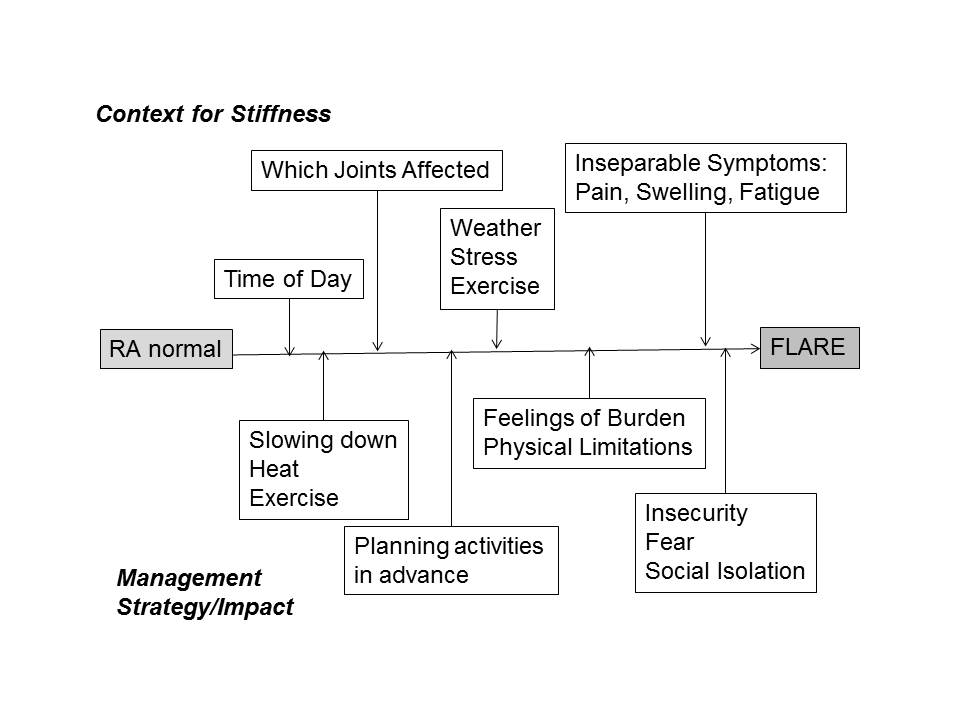Session Information
Session Type: Abstract Submissions (ACR)
Background/Purpose:
Stiffness was included in the 1961 and 1987 Rheumatoid Arthritis (RA) classification criteria and continues to be commonly queried in clinical care. Its relative contribution to disease activity levels is controversial possibly due to limited knowledge of how people with RA experience stiffness and its impact on daily life.
Methods:
We held focus groups (FG) with people with RA recruited from an academic clinic and private practice setting to explore stiffness experiences. Inductive thematic analysis was conducted by a team of clinical and behavioral scientists to identify themes.
Results:
FGs (N=20 people) were held 2 – 11/2012. Most (75%) were female, mean (SD) age 57 (13) yrs and RA duration 16 (8) yrs. Mean patient global scores were 44 (27), pain (100 mm VAS) 47 (30) and mHAQ 0.48 (0.55). Five themes were identified: 1. People with RA outlined a hierarchical and relational conceptualization of symptoms (stiffness, pain, swelling, fatigue) 2. Stiffness was associated with management strategies and symptom alleviation 3. Stiffness was described in temporal terms 4. Stiffness had individual meanings 5. Stiffness had impact on physical, emotional and social well-being. Stiffness, pain and swelling were difficult to distinguish between as they co-occurred or as pain increased. Strategies to alleviate or reduce stiffness were common (warmth, slow down, stretch, swim). Stiffness was primarily characterized by onset (morning, evening) and key exacerbating factors (weather, stress, exercise). Participants related their current level of stiffness to the usual for them since developing RA and independently introduced “RA normal” as their reference state. The spectrum of stiffness intensity spanned from “RA normal” to flare (“I went into total lock up”). Stiffness impacted physical, emotional, and social health and was poorly understood by people without RA in comparison to pain. Unexpected or overwhelming stiffness caused feelings of anxiety, fear and vulnerability.
Conclusion:
Stiffness is an integral part of RA and may be more heterogeneous in presentation than previously recognized. People living with RA report stiffness can have a significant impact on daily life, often underappreciated by family and others. The current model of morning stiffness duration, used in clinical practice and clinical trials, poorly reflects the experiential descriptions of stiffness which encompass temporal patterns, location, intensity, and impact on life activities. Individuals’ use of “RA normal” as the new reference point for change in disease states might affect how insightful our clinical questions are, when we probe disease activity and impact on health and health related quality of life. The diversity of stiffness experiences, adaptations, and life impact suggest that a more individualized assessment may be needed to effectively monitor stiffness and ultimately enhance clinical care.
Disclosure:
A. M. Orbai,
None;
K. Clegg-Smith,
None;
S. J. Bartlett,
None;
E. De Leon,
None;
M. Jones,
None;
C. O. Bingham III,
None.
« Back to 2013 ACR/ARHP Annual Meeting
ACR Meeting Abstracts - https://acrabstracts.org/abstract/stiffness-from-the-perspective-of-people-living-with-rheumatoid-arthritis/

